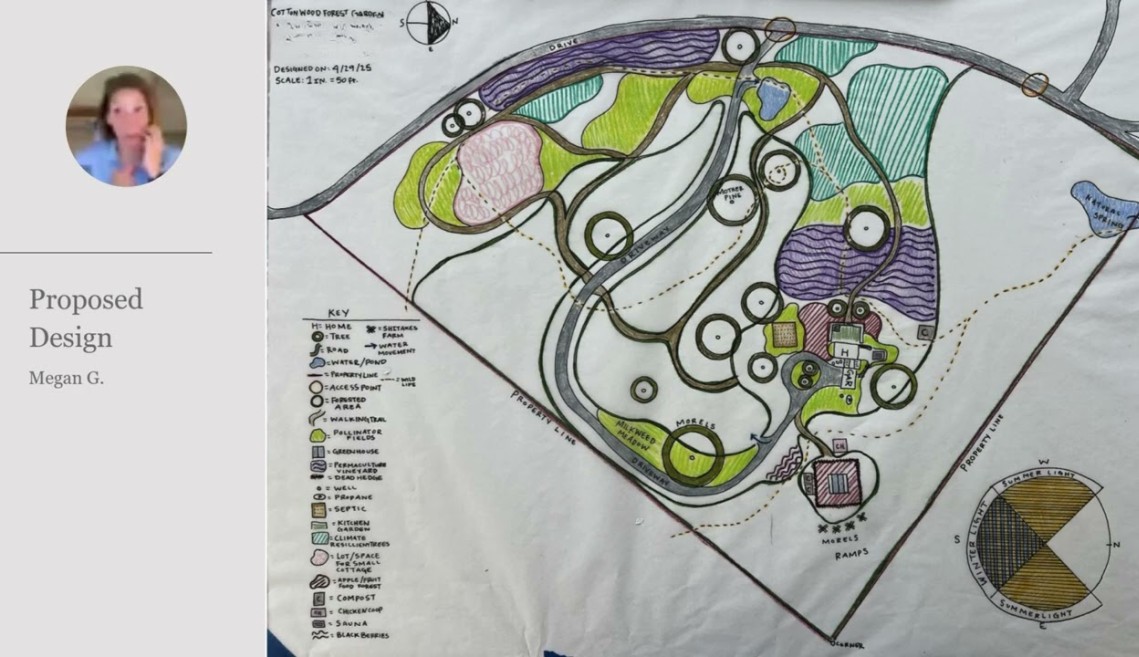Instructor: Monica Ibacache, Beyond Organic Design, mji33 [at] cornell.edu (mji33[at]cornell[dot]edu)
Purpose:
To examine the basics of permaculture design and understand the potential for ecological design on a multitude of scales and contexts. Students will apply principles and ecosystem understanding to the Permaculture design process by engaging in a personal design project of his/her choosing and walk through the steps to complete a meaningful landscape plan including design concepts, budget details, and strategies for implementation.
Course Objectives:
Upon completion of this course, you will be able to:
- Define permaculture and describe key elements of permaculturesystems.
- Describe the parts of a map and create a base map for your design site.
- Conduct a thorough assessment of current environmentalcharacteristics.
- Set specific and detailed goals for designs.
- Develop design concepts and conduct necessary research.
- Create accurate project budgets and plans for implementation
Course Philosophy:
Permaculture is a philosophy with three explicit ethics; Care for Earth Resources, Care for People, and Redistribution of Surplus. This course engages students in learning a foundational perspective that guides them towards designing backyards, gardens, farms, businesses, and communities in the frame of regeneration; the process of healing and restoring ecological health.
Approach:
This course will present a wide range of information including historical perspectives, ecology, landscape design, and activities to apply content to a student’s daily life. The content acknowledges the existence of climate change, ecosystem degradation, and decline in human health factors in order to understand how we can overcome these challenges.
Expectations:
- Most importantly: Keep up with weekly assignments and activities as they deliberately build on and refer to previous lessons.
- This course relies on your self-motivation to complete assignments, ask questions, and participate in community dialogues around the material presented.
- The readings are a critical part to understanding content.
- The activities will compliment readings and expand your understanding of the natural world and your impact on it.
- Plan on spending 10 - 15 hours per week working through course lessons.
- No previous experience in the natural sciences, ecology, landscape design, farming, gardening etc. is required, but will be helpful in expanding your understanding of permaculture. Sharing your ideas and knowledge in the discussion forums can benefit the entire class.
- Permaculture attracts a wide variety of people and the more we know your personal interests and goals the better we can address them through lessons, journals and discussion forums.
- As complex and emotional issues are discussed, please be sensitive and supportive of other classmates. Rude or offensive language, and overly critical commentary will not be tolerated.
Choosing your design site:
An outdoor site is a critical part of your activities in this course. It will be the basis of your final portfolio to earn your Permaculture Design Certificate if you take all three parts of the course.
You will spend a considerable of time outside at your selected site. If you own property it might your ideal site. If you are not a landowner consider a site that would benefit from some design consideration such as a community park, garden, or the land of a friend or relative. A place that is close to where you live or work is best, as you will visit it often.
Lessons:
Each week’s lesson contains the following components:
- Presentations of the core material, usually as a video or series of videos.
- Readings to reinforce or expand upon the material presented.
- Activities conducting around your chosen site; some with deliverables to share with the instructor or your classmates.
- Reflective writing to allow you to develop a thoughtful perspective and a dialogue with the course instructor.
- Discussion forum questions and topics for discussion.
- Optional additional readings, activities and resources.
Deadlines:
Each week’s lesson contains the following components:
- Presentations of the core material, usually as a video or series of videos.
- Readings to reinforce or expand upon the material presented.
- Activities conducting around your chosen site; some with deliverables to share with the instructor or your classmates.
- Reflective writing to allow you to develop a thoughtful perspective and a dialogue with the course instructor.
- Discussion forum questions and topics for discussion.
- Optional additional readings, activities and resources.
Required Readings:
There is no required textbook through it is highly recommended that students purchase Introduction to Permaculture by Bill Mollison (2nd printing, 2000) as an excellent supplementary text. A list of optional books to be used with this course can be found in the 'Additional Resources' topic at the end of the course.
Supplies:
- A computer with reliable Internet access (to view videos) and the ability to compose and submit written assignments is essential.
- A roll of 24” – 36” tracing paper
- A set of your favorite markers or colored pencils
- A clipboard for field assignments
- A space to keep a large (minimum 24” x 36”) base map.
- You may also want to start a binder for assignments, handouts and other resources.


